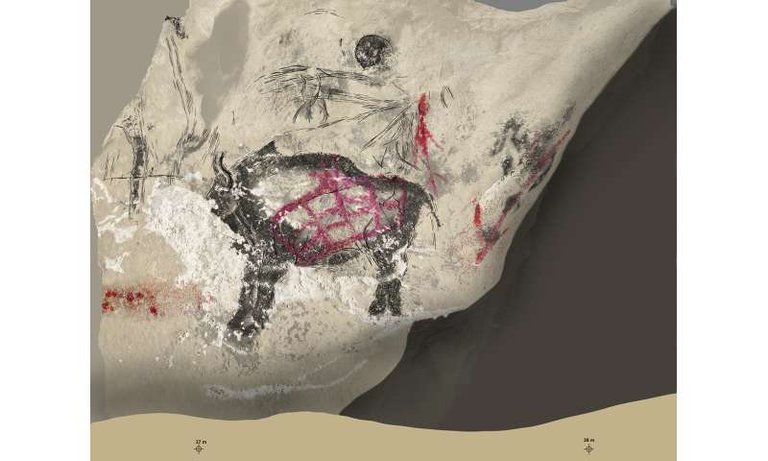On another social media network that shall remain nameless, Graham Hancock, a noted author and researcher into ancient mysteries and the hidden origins of human civilization, recently posted the following update:

"Some years ago there existed an ancient painting of this species inside the Hypogeum of Malta. It was scrubbed off the walls of the Hypogeum on the orders of a former director of the National Museum because it suggested that the Hypogeum -- a truly amazing rock-hewn underground structure -- might be much MUCH older than archaeologists want it to be. Specifically it raised the paradigm-busting possibility that the Hypogeum might not date to the relatively recent Neolithic, as preached by archaeologists, but to the Upper Palaeolithic when humans, according to orthodox teachings, are not supposed to have had the ability to create massive rock-hewn and megalithic structures like the Hypogeum....."
Here is a link to the article he referenced: The Higgs Bison—mystery species hidden in cave art
Is something such as the denial of ancient cave art by an ostensible archeological authority merely a telling symptom of the greater human condition?
Perhaps a large part of human kind's problem is that when confronted by some bit of reality that doesn't fit with the carefully constructed maps we've created and by which we pretend to actually know about ourselves and our world, that we would much rather 'scrub it off the wall' than be unsettled by it. Ultimately we can't scrub away whatever is, no matter how uncomfortable, any more than we can scrub our own shadows off the ground.
The world around us is impermanent, temporal, and in constant motion. Our map which is the image we maintain about the world, is static and fixed. The map as an image or a snapshot is generated as a result of thinking and is always limited by what we know. It seems therefore one of our greatest strengths is also one of our greatest weaknesses. Knowledge as the field of thinking is trying to escape from a dilemma it itself has created. Recognizing its own limitations it desires to transcend itself but all it knows is it's process of map making. Having come face to face with itself it is trying to escape its own shadow.
Through the same process we also create for ourselves the map that we know as our self image, the image we have about ourselves and by which we relate to ourselves. Our self image is static and fixed and put together as a result of our experiences over time, which are also limited. But to identify yourself - 'you' - as the map, as the image put together by thought, is to deny the reality that you are also impermanent and in constant movement with life and therefore ever changing.
Generally what we really mean by 'change' is that we want to upgrade the map we define ourselves by, to trade the current map for a shiny new one, and that is why we are ever comparing ourselves, which is to say our self image, with that of others, and to do that is to degrade oneself. Literally to de-grade, mark down. This creates a never-ending feedback loop, like a mobius strip, and in the same way that thought tries to transcend its own limitations, we attempt to transcend our own self image through ever more images, or through aiming toward some more superlative idea we maintain about the future which is just a projection.
What if there were another way? What would happen if we relaxed our attachment to the map? Can we live within, or with an awareness of, our own blind spots without trying to forever escape them? Can we admit our own imperfections? Can we forgive ourselves for not adding up in our own minds to everything we were ever led to believe we should be? Can we actually come to welcome the shadows rather than trying to 'scrub them off the walls'?
Michael Curving is a co-host of the Return Of Gnosis podcast, creator of WhoWillBuildTheRoads.com, and blogger at Curving.org. Follow him here on SteemIt and connect with him on Twitter.
I love Graham's work, it brings to light plenty of history many people want us to forget. We are not perfect by any means, but blindly denying new evidence will leave us in the dark for a lifetime.